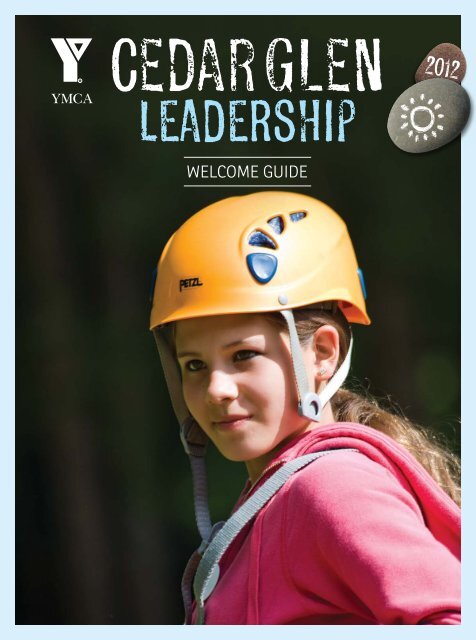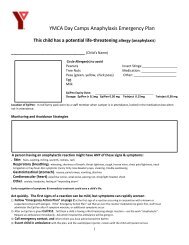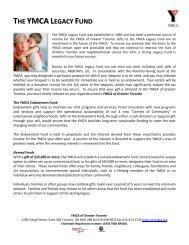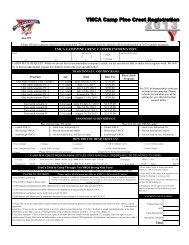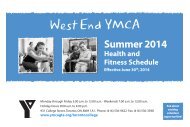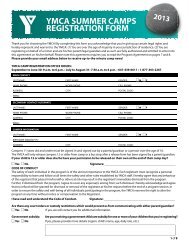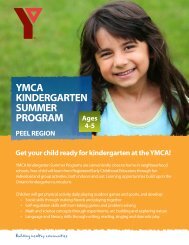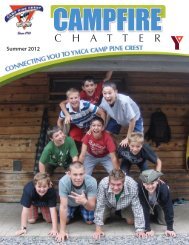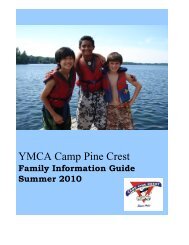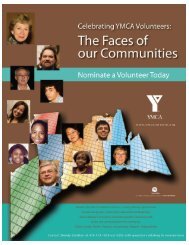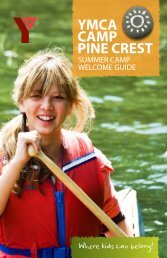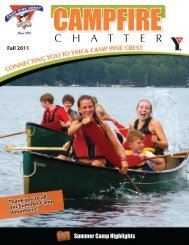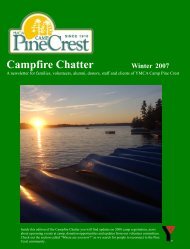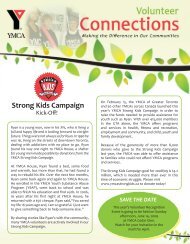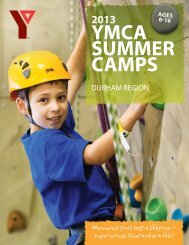LEADERSHIP - YMCA of Greater Toronto
LEADERSHIP - YMCA of Greater Toronto
LEADERSHIP - YMCA of Greater Toronto
- No tags were found...
You also want an ePaper? Increase the reach of your titles
YUMPU automatically turns print PDFs into web optimized ePapers that Google loves.
Cedar Glen<strong>LEADERSHIP</strong>2012WELCOME GUIDE
<strong>YMCA</strong> CEDAR GLEN<strong>LEADERSHIP</strong> WELCOME GUIDEWelcome to Leadership at <strong>YMCA</strong> Cedar Glen!We’re so excited you’re joining us at <strong>YMCA</strong> Cedar Glen this summer. Our leadershipprograms are a great way for you to learn more about yourself and your leadershippotential. You’ll discover what it takes to work at camp, make new friends and — mostimportantly — have fun!As you prepare for your program this summer, you may have some questions aboutthe experience, including what you need to bring and some <strong>of</strong> the activities you’ll beparticipating in. This guide is meant to answer those questions, so make sure you readevery page and share it with your family members as well.Whether you are part <strong>of</strong> the Junior Leaders in Training (JLIT), Leaders in Training (LIT), orCounsellor in Training (CIT) program at Cedar Glen this summer, you’ll spend part <strong>of</strong> yoursession at <strong>YMCA</strong> Cedar Glen, and part <strong>of</strong> your session on a canoe trip in Muskoka, Ontario.<strong>YMCA</strong> Camp Pine Crest is partnering with us to provide this amazing opportunity.These trips, along with the time you spend participating in interactive learning sessionsand camp activities, will help you feel more confident about yourself in a variety <strong>of</strong>situations — many <strong>of</strong> which will be new or unfamiliar to you. Although these types <strong>of</strong>situations can be uncomfortable, it is when you’re exposed to new responsibilities,problems and skills that you develop your leadership skills. To get the most out <strong>of</strong> yourleadership program at Cedar Glen this summer, you’ll need to be ready and willing t<strong>of</strong>ully participate in all situations with a positive attitude and a willingness to learn.As you begin preparations for your leadership experience this summer, please take thetime to thoroughly read this information guide and contact me if you have any questions.I’m more than happy to help!Sincerely,Marissa Straatsma-RupkeCamp Director<strong>YMCA</strong> Cedar Glen905-859-9622 x 241marissa.straatsma@ymcagta.org
Expectations and SuccessYour personal expectations are important to us. Wewant you to get the most out <strong>of</strong> your experience. We’vedesigned each program to ensure you’re set up forsuccess with challenges and opportunities to grow andlearn about your personal strengths — as well as theimportance <strong>of</strong> working together.As a member <strong>of</strong> the group you will have certainexpectations <strong>of</strong> others, and they <strong>of</strong> you. Ourexpectation is that you are a full member <strong>of</strong> the group,participating in all aspects <strong>of</strong> the program <strong>of</strong>fered anddoing your part to achieve team success. While outon the canoe trip, individuals are expected to takeinitiative and will share trip responsibilities such ascooking, rising early to assist with packing up campeach morning, motivating others and navigating.This equality among your leadership group will ensurethat all voices are heard and that everyone has apositive experience.From your trainers you can expect solid leadershipand dedication. We want to make this a successfulexperience that will encourage you to try newactivities and make new choices in your life. Yourleaders are a resource for your questions, and willhelp coach you in learning the skills necessary fora positive camp experience. Your trainers will be amodel <strong>of</strong> leadership and safety, and <strong>of</strong> course will bethere to support or intervene in difficult situations.The success enjoyed by the entire group will comefrom full participation, a positive attitude, and thewillingness to try new things and learn from everyone.Junior Leaders in Training (JLIT)(13 years old)This program is tailored to help you make the transitionfrom camper to leadership participant by emphasizingthe importance <strong>of</strong> teamwork and self awareness. You’llfocus on personal and group development as well asprogram skills in one <strong>of</strong> three key areas <strong>of</strong> your choice(outdoor living skills, adventure or environmentallearning).While in camp you’ll participate in learning sessionswith your peers, traditional camp programs (low ropes,high ropes, mountain biking, etc.), and assist in planningand running programs for our younger day campers.You’ll also participate in a three-day, two-night canoetrip in Muskoka, Ontario.Your two-night canoe trip will explore the back lakes <strong>of</strong><strong>YMCA</strong> Camp Pine Crest. Focusing on skill development,paddling days are short to ensure you have ampletime at your campsite learning how to read maps, cookover campfires, and how to leave minimum impact onthe land. A short portage connecting the lakes willstrengthen the bond amongst the group as they willneed to work together to carry their canoes and campingequipment.Goals and objectives• To be positive role models in the camp community• To contribute effectively to the JLIT group• To learn about personal strengths and challenges ina group setting• To develop skills in various camp programs• To be introduced to planning and running programsfor younger campers
Leaders in Training (LIT)(14 years old)This program provides an opportunity for you t<strong>of</strong>urther explore your leadership skills and potential.Through interactive learning sessions and hands-onexperience, you’ll learn about group dynamics, leadershipstyles, working with children, and planning fun andcreative programs.You’ll work toward a short counselling placementand implementing a camp-wide theme day for ourCedar Glen day camp participants. Additionally, you’llparticipate in a number <strong>of</strong> traditional Cedar Glenprogram activities (high ropes, low ropes, mountainbiking, campfires, etc.) as well as a four-day, threenightcanoe trip in Muskoka, Ontario.The LIT canoe trip will depart from the <strong>YMCA</strong> CampPine Crest docks and explore the Musquash River,Gibson River or Severn River. You’ll have the opportunityto help navigate and make decisions regarding whento stop for breaks and where to set up your camp site.Short portages around various rapids will challenge yourgroup and help break up the paddling day. After the trip,<strong>YMCA</strong> staff will pick you up at the end <strong>of</strong> the route.Goals and objectives• To be positive role models in the camp community• To contribute effectively to the LIT group• To learn about personal strengths and challenges ina group setting• To be introduced to various styles and theories <strong>of</strong>leadership• To plan and implement a variety <strong>of</strong> programs foryounger campers, including a day camp theme day• To complete a short placement/job shadowingexperience in Cedar Glen’s day campCounsellor in Training (CIT)(15 to 16 years old)This program is designed to help you gain the skillsand experience required to become a successful campstaff member in the future. Learning sessions willfocus on working with children: creative programming,behaviour management, safe supervision, programleadership and more. You’ll also earn your StandardFirst Aid certification (a two-day, 16-hour course). All<strong>of</strong> this learning will be put into practice as you worktoward planning and running a variety <strong>of</strong> day campprograms for younger campers, as well as completinga week-long placement in our day camp program.In addition, you’ll participate in workshop sessionsfocused around resume building and job interview skills.Upon completion <strong>of</strong> the CIT program, we encourageyou to have a one-on-one interview with our campdirector. Successful candidates will be placed in a<strong>YMCA</strong> <strong>of</strong> <strong>Greater</strong> <strong>Toronto</strong> day camp program <strong>of</strong> theirchoice. You can check out all the options atymcagta.org/daycamps. Volunteer hours earnedduring this experience can be used toward requiredhigh school volunteer hours.You’ll also participate in a five-day, four-night canoetrip in Muskoka, Ontario. This trip will help developyour potential as leaders. With the help <strong>of</strong> <strong>YMCA</strong> staff,you’ll learn how to read the weather, navigate throughGeorgian Bay’s famous islands and make decisions inthe group’s best interest. Throughout your trip, variousleadership opportunities will help for you develop yourown leadership styleNote: The <strong>YMCA</strong> <strong>of</strong> <strong>Greater</strong> <strong>Toronto</strong> requires camp staffturn 17 years old during their first summer <strong>of</strong> work. Ifyou complete the CIT program while you are 15, youwill be eligible for a junior counsellor position at one<strong>of</strong> our many 2013 day camp programs around the cityupon the completion <strong>of</strong> a successful interview.Goals and objectives• To be positive role models in the camp community• To contribute effectively to the CIT group• To learn about personal strengths and challenges ina group setting• To learn about working with and leading children• To complete a Standard First Aid certification• To plan and implement a variety <strong>of</strong> programs forday camp participants• To complete a week-long placement in our daycamp program• To build a resume and participate in a mock interview• To complete 40 hours <strong>of</strong> community serviceTypical Day at <strong>YMCA</strong> Cedar Glen forLeadership ParticipantsEach day at Cedar Glen will bring new and excitingchallenges to build your leadership skills. Here’sa sample <strong>of</strong> what a typical day will look like — butremember that many days are not typical!• 7:15 a.m. – rise and shine• 7:30 – breakfast• 8:15 – flag raising and morning circle• 8:30 – cabin clean• 9:00 – leadership session• 10:30 – program time! (high ropes, climbing wall,mountain biking etc.)• 12:00 p.m. – lunch• 12:45 – rest hour• 2:00 – day camp placement• 4:00 – swimming• 5:00 – dinner• 6:00 – journaling/reflection time• 6:30 – evening program• 8:00 – campfire• 10:00 – free time• 11:00 – quiet time/lights out
Arrival and DepartureTravelling by car<strong>YMCA</strong> Cedar Glen will be open for you to arrive by carbetween 2 and 4 p.m. on the first day <strong>of</strong> your session.Parents and family are invited to meet the leadershiptrainers, tour the camp and help settle you into yournew home. The camp program will begin promptly at4 p.m., so we ask all parents and family members to beready to leave by that time.Pick-up time at <strong>YMCA</strong> Cedar Glen on the last day <strong>of</strong> thesession is between 3 and 5 p.m.Travelling by busThis year we’re <strong>of</strong>fering two different types <strong>of</strong> busservice — both <strong>of</strong> which are included in the camp fee.Option A: Door to Door Bus ServiceThis year <strong>YMCA</strong> Cedar Glen is pleased to announce thatwe will be <strong>of</strong>fering door-to-door busing for leadershipcamp participants. Our door-to-door busing area extendsnorth to Hwy 9, south to the 407, east to the 404 and westto Hwy 10. If you live within this area, you qualify for ourdoor-to-door bus service! We’ll provide a 10 to 15 minutewindow for the drop <strong>of</strong>f and pick up at the beginningand end <strong>of</strong> the session. This information will be madeavailable the week before your session at camp begins.Option B: Community Bus ServiceIf you live outside <strong>of</strong> the door-to-door transportationzone, you can use one <strong>of</strong> our community pick-up locations.We have buses running from downtown <strong>Toronto</strong>,Mississauga and North York on the first and last days<strong>of</strong> each session.Bus Location Address Pick up(Sunday)Drop <strong>of</strong>f(Friday)BirchNorth York <strong>YMCA</strong>567 Sheppard Ave. E.(Sheppard and Bayview)2 p.m. 4 p.m.Maple Central <strong>YMCA</strong> 20 Grosvenor St. (Yonge and Grosvenor) 2 p.m. 4 p.m.CedarMississauga <strong>YMCA</strong>325 Burnhamthorpe Rd. W.(Burnhamthorpe and Hwy 10)2 p.m. 4 p.m.
What to Bring to CampPacking for camp is an important part <strong>of</strong> the preparationprocess. You may have many questions about what you’llneed, especially as you head out on a canoe trip (maybefor the first time). Below are suggested packing lists forliving in your cabin or yurt, as well as for your canoe tripexperience. There’s limited storage space in your livingarea, and you will be sharing space with other leadershipparticipants, so packing efficiently is important. Some<strong>of</strong> the items that you pack for the canoe trip can also beused for daily camp life, and vice versa.You’ll notice that we suggest non-cotton items for thecanoe trip as much as possible. There are two mainreasons for this. First, once cotton gets wet it takesa long time to dry and becomes very heavy. Second,wearing wet cotton items will not keep you warm, butwearing wet fleece or wool items will.Do your best to be resourceful and find items at homethat you can use. Second-hand stores are also a greatplace to pick up affordable clothing choices for acanoe trip. Remember that what you bring on trip willget dirty and worn, so pack wisely — don’t bring yourfavourite, most expensive outfit along!• Pillow/sheets/comforter/duvet (optional for use incamp), sleeping bag (necessary for canoe trip)• Eyeglasses/contacts if required (bring an extra pair toleave with the wellness coordinator, just in case)• 2 pairs <strong>of</strong> close-toed running shoes (one will get weton trip), and 1 pair <strong>of</strong> sturdy sandals with a heel strap(note: flip-flops and Crocs are not permitted at camp)• Medications if required (to leave with wellnesscoordinator)• Raincoat with a hood and rain pants (not windbreakeror poncho style, please)• Sunhat and sunscreen• 4 heavy socks (wool or fleece — not cotton)• 6 – 8 pairs <strong>of</strong> light socks• 10 – 12 pairs <strong>of</strong> underwear• 3 pairs <strong>of</strong> long pants — at least one non-cotton forcanoe trip• 4 pairs <strong>of</strong> shorts — at least one non-cotton for canoe trip• 4 long-sleeved shirts — at least one non-cotton forcanoe trip• 3 sweaters — at least one wool or fleece for canoe trip• 1 jacket• 2 towels• 2 pairs <strong>of</strong> pajamas• Toothbrush and toothpaste• Hair brush, hair elastics, etc.• Sunglasses• Flashlight with extra batteries• Refillable, reusable water bottle (at least 1 litre in size)Note: Leadership campers will have the opportunity todo some laundry during their session.Optional/suggested items:• Writing paper, envelopes and stamps to write home• Musical instruments• Books, journals, pens• Camera• Rubber boots• Insect repellent• Small backpack for carrying belongings around sitePlease do not bring:• Matches, lighters, pocket knives• Cell phones or pagers• Electronic toys or devices (e.g. Nintendo, iPod, laptopcomputers, etc.)• Candy, gum, snacks, s<strong>of</strong>t drinks, junk food• Curling irons, hair dryers, etc.• ValuablesThere are two main reasons that we ask you to leaveelectronics at home. First, they are generally a littlefragile and don’t stand up well to the camp life (i.e.getting wet, being left outside, dropped <strong>of</strong>f bunks, etc.).Second, they are very individual. It’s hard to be part<strong>of</strong> a group experience when you are plugged into youriPod, texting on your phone, etc. Remember that yourleadership experience is about participating and takingadvantage <strong>of</strong> learning opportunities and being a part<strong>of</strong> camp life. Electronics do not contribute to this feeling<strong>of</strong> community.Note: <strong>YMCA</strong> Cedar Glen has a zero tolerance policyfor possession <strong>of</strong> firearms and possession and/orconsumption <strong>of</strong> alcohol, tobacco and non-prescriptiondrugs. Any participant found in possession <strong>of</strong> theseitems <strong>of</strong> found to have consumed these items while atcamp or involved in any camp program will be requiredto meet with the camp director, which may result inbeing dismissed from the program.
Frequently Asked QuestionsWhat will I eat when I’m at camp?Meals at Cedar Glen are served in the Main Lodge DiningHall. Our food service staff prepares fresh and nutritiousmeals and snacks daily, following the Canada FoodGuide recommendations. If you have allergies or dietaryrestrictions, you’re served a menu modified to suit yourparticular requirements. This information will be confirmedin a phone call prior to the camp experience.We request that you do not bring along any food to campfor a couple <strong>of</strong> reasons. One, sometimes other campers inyour cabin or program may have severe food allergies, andwe want to protect them from exposure to items that maybe dangerous to them. Two, food that is left in cabins andyurts can attract unwanted pests and other critters. Anyfood that is sent along to camp will be held in the camp <strong>of</strong>ficeuntil the end <strong>of</strong> the session and sent home at that time.Where will I sleep at camp?JLIT and LIT campers will be staying in our cabins in thevalley. Each cabin will sleep four campers and is locatednearby to staff cabins, washroom facilities and running water.CIT campers will be staying in our yurts. Yurts areround, permanent tents that sleep ten campers each. CITcampers will use shower and washroom facilities locatedin the basement <strong>of</strong> the Main Lodge.When you are on your canoe trip you will be sleepingin tents!What if I get sick or injured at camp?The wellness coordinator at camp is responsible for thehealth care <strong>of</strong> all campers and staff while at camp. Heor she will be available on check-in day to discuss anyhealth concerns or medications that will affect you whileyou’re at camp. If you become ill or injured at camp, thewellness coordinator will contact your parents/guardiansto discuss next steps. All camp staff are trained inStandard First Aid and Level C CPR and are trained torespond to emergencies on site.What if I need to take medication at camp?If you require prescription medication at camp, yourparents/guardians will need to fill in the medication formavailable either with the camp staff on the bus or at campwhen you arrive on the first day. All medications broughtto camp need to be in the original container with yourname and the date <strong>of</strong> the prescription on the container.If you require non-prescription medication, please obtaina doctor’s note that indicates the following:• Your name• Your age• Name <strong>of</strong> the medication• Dosage directions• Expiration date <strong>of</strong> the note• Directions on time to administer or specific signs andsymptoms that indicate medication needs to be administered• Doctor’s signatureNon-prescription medications also need to be broughtto camp in their original container.All medications are kept in a locked cabinet at camp, can berefrigerated if required, and are administered by our wellnesscoordinator as needed. If the medication is for emergencyuse (e.g. epi-pen or puffer) the counsellor will carry it in theiremergency waist pack so it is nearby at all times.Note: Without this information, we will be unable toadminister medication to you while you are at camp.How can my parents/guardians contact me at camp?All campers enjoy receiving mail, and we encourageyour parents and family members to write. We are able toreceive emails at cedarglen.overnightcamp@ymcagta.org.Emails are printed and delivered daily at mealtimes.Senders should make sure that all emails are clearlylabeled with your name in the subject line. You’ll have anopportunity to write letters home throughoutyour camp session, so it’s a great idea to bring alongenvelopes that have stamps on them. You won’t haveaccess to email or telephone while at camp.If there is an emergency and a family member needs tocontact camp, we can be reached at 905-859-9622.Can anyone contact me while I am on the canoe trip?Telephones are not available for camper use on canoetrips. However, any mail and or emails will be awaitingyou upon your return to camp, and this is <strong>of</strong>ten a greatwelcome back into the camp community after a greattrip experience.What if there is an emergency when we are out onour canoe trip?Each trip that heads out from Camp Pine Crest leavesbehind a well-detailed route itinerary that includes theroute the group will be paddling during the day, wherethey will be camping each night, as well as healthinformation for each participant and trip leaders. Tripleaders bring a cell phone which is used to contactcamp at anytime for questions regarding weather, theirroute, or the general well-being <strong>of</strong> participants.Staff are highly qualified and trained to deal with anypotential risks (weather or first aid situations) and aresupported by the full-time Pine Crest tripping staff inmaking the appropriate and necessary decisions.What kind <strong>of</strong> food will we eat on the canoe trip?You will have input and help your leaders plan the menufor your out-trip. Staff will ensure that the mealsplanned for the trip are selected according to a healthybalanced diet with enough calories for the increased needsplaced on your body during a camping trip.What about drinking water on the canoe trip?All trips carry a combination <strong>of</strong> water filter pumps andchemical water treatment to ensure that the waterconsumed is free from water-borne bacteria. It’s camppolicy that all staff and leadership participants treat theirwater prior to consumption and cooking.
Contact InformationIf you’ve read this entire booklet andstill have more questions about camp,we’re happy to help you out. The bestperson to talk to is Marissa Straatsma-Rupke, Camp Director. Call Marissaat 905-859-9622 x 241 or emailmarissa.straatsma@ymcagta.org.<strong>YMCA</strong> Summer Camps2200 Yonge Street, Suite 300<strong>Toronto</strong>, ON M4S 2C61-877-303-2267 or 647-439-6611Fax: 416-928-2030summer.camp@ymcagta.orgymcagta.orgCharitable Registration #11930 7080 RR0001


